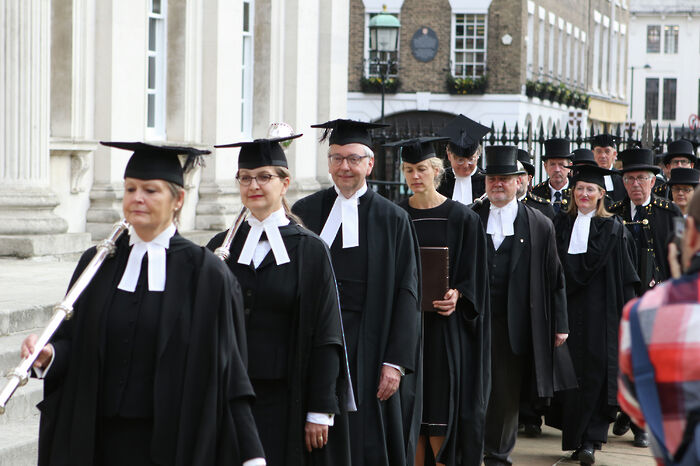Stephen Toope: ‘We know Cambridge is a very tough academic environment’
Cambridge’s new vice-chancellor speaks exclusively to Varsity about access, welfare, and beating Oxford

We are not alone. Speaking to Professor Stephen Toope, the new vice-chancellor, I am joined by the University’s director of communications, Paul Mylrea, and the remnants of freshers’ flu. I feel a little outgunned.
Why Mylrea is here, I’m not entirely sure. Perhaps it’s because Louise Richardson – Toope’s equivalent at Oxford – had a mixed summer, putting her foot ankle-deep in her own mouth over some poorly-worded remarks about homophobic professors. But Stephen Toope is not Louise Richardson.
That’s not to say comparisons can’t be made. In one of her many vacation interventions, Richardson defended her £350,000-a-year salary, in a climate where vice-chancellor pay is under intense scrutiny. Last week, Toope had to mount a similar defence of his own salary: £365,000 excluding pension contributions. The revelation was inevitable and, perhaps, inevitably embarrassing.
Toope’s installation and arrival has been a fairly smooth affair, but now the Latin and gowns are finished with, he will have to hit the ground running. After a long period away from Cambridge since his days as a student here, his immediate experience will echo that of many the new freshers: thrust into the middle of debates about access, divestment and welfare.
The first is a complex and thorny issue, with the University constantly pulled between the challenge of marrying expanding participation with maintaining standards – usually in the form of demanding top grades from applicants. “I am pleased that over the last number of years Cambridge has worked really hard generally to encourage greater access,” he says.
“This year apparently we have more state-educated students than we’ve had for 35 years” – which is true, if arguably unremarkable – “so work is being done,” in the words of the vice-chancellor. “I want to be really clear that the University is taking this seriously and is trying to improve the circumstances.”
Grade requirements though, he says, are “a challenging one”. “We know Cambridge is a very tough academic environment. One of the things I have always felt very strongly about is that you never want to put people into a situation where they can’t succeed. One of the challenges for students coming from backgrounds where they haven’t had the same kind of education opportunities – and therefore attainment – is if you then throw them in an environment where the expectation is that they will perform.” He stresses the links with government, schools and not-for-profit organisations that Cambridge has to form, saying it has “has to do a lot of things at the same time to try to improve this record”.
All very well, I say, but surely sympathy can be drawn somewhere – what about a ‘worst-case-scenario’ applicant, with the biggest possible combination of disadvantages: black, educated at a badly-performing school, raised in an area of low higher education participation in a poor family: wouldn’t it be fair to let a clearly gifted student from that background get in on AAA? “There’d be lots of consequences to that, you couldn’t simply have a system that changes overnight to say ‘We’re going to take people with three As’ unless you had a very detailed process in place to actually allow those people to be successful while they’re here. You don’t want to put people in a position where, when they arrive, all of a sudden they’re told: ‘We want you, but we want you only our traditional terms, and now you’re failing’,” he says.
“So that would be an unacceptable response. If it were the case that the University wanted to move to any change in the admissions standards, that would have to be matched with very detailed processes to make sure that the people could succeed when here.”
He settles, as he will at several points in our discussion, on the wisdom of consultation: “I think it’s something that the colleges and the University would have to discuss in great detail; I’m sure there would be very different opinions on this – I have no doubt.”
“One of the things I have always felt very strongly about is that you never want to put people into a situation where they can’t succeed.”
Does he think Cambridge students are working in an unusually pressured environment? “We admit some of the most gifted students in the world, and certainly from the United Kingdom, and then we do put them into very, very demanding programmes.” He is keen to stress that he doesn’t believe the University to be unique in that regard, and warns against ‘silver bullet’ solutions like nine-week terms and reading weeks, but acknowledges a better job could be done making students aware of the services available to them.
His apparent faith in the decision-making capabilities of Cambridge’s rarely united institutions is emphasised again when I raise a new topic: the ongoing discussions at Lucy Cavendish and Newnham over whether they should open their doors to transgender students who self-identify as women, even if they do not have legal recognition. “I’m confident that they’ve looked carefully at the situation,” Toope says.
I ask whether he would be disappointed if, when the dust has settled, Newnham were to decide not to change its policies. “No, because I like the idea that colleges have an ability to take tailored approaches that seem most appropriate for what they’re trying to achieve. I think it’s very important that self-identified transgender students have access to the University, and now we have a college [Murray Edwards] that is clearly saying they can apply.”
So far, so emollient – if Toope is planning to crack the whip with the colleges, he’s not advertising it. What about divestment, an issue where the decision-making pressure is firmly in the hands of the University Council, which Toope heads? “My starting proposition is climate change is an existential threat to the world. I believe that, and think that the University does have an obligation to do everything in its power, through a range of ways, to be addressing that issue.”
Time to pull the plug on Cambridge’s fossil fuel investments, then? “Whether or not divestment is in and of itself the right answer is something I’m actually going to wait to hear from the working group,” he says. “I’m genuinely unsure, and the reason I say that is that I’ve heard – it’s not the first time I’ve been through these debates – very interesting argument on both sides. One is, you just have to make the moral statement… the other is if all of the institutions that actually feel strongly about these issues disengage from trying to be actively working with managers and with corporations, then we may actually make the situation worse, by allowing the people who don’t care to be the only people who are making the the case about how the corporations should behave.”
His response treads the line between the Zero Carbon society’s all-or-nothing response, and the more subtle, but less unassailably ethical, approach of an organisation like Positive Investment Cambridge. He speaks of a “balance” to be struck between current moral interests, and the long-term financial interests of the institution – students and staff “100 or 200 years from now”.
Cambridge thinks in centuries, and in that context the impact of a single vice-chancellor can be limited. Does Toope hope to leave Cambridge as the best university in the world? For a moment, he offers something like ambition: “If it were possible to know the answer to that question, I would love to say ‘yes’”. Immediately though, he softens: “I would love for Cambridge to be widely acknowledged as one of the very small number of top universities in the world” – but adding that he is “not a great believer in league tables”.
Toope’s tenure will involve a unique set of challenges. Beyond ongoing discussions about higher education reform, Brexit looms over many aspects of the University’s activities, particularly amid a flagship long-term funding drive. “It’s a tough strategic question for the University,” he admits. “What I would say is that the whole university sector in the UK is globally admired, and I very much hope that the government, as it’s negotiating around Brexit, thinks of the university system as one of the most important assets of the country. I genuinely believe it is.”
He spoke about the “halo effect” of Oxbridge, suggesting the government should share his belief that the strength of the country’s top two universities pulls up the rest of the higher education sector, which he sees as one of Britain’s exceptional strengths. “The message that I’ve been trying to send is that I think our interests are very strongly aligned, in many, many ways.”
At the University of British Columbia (UBC), in Canada, where Toope was previously president, he apparently achieved something of a cult status among the students. When he’s not lobbying the government over our exit from the European Union, I ask, will we find him singing alongside student union leaders? “The short answer is I do want to be accessible to students.” What shape will that accessibility take? Toope’s answer: ‘breakfast meetings’ with students, something he tried at UBC. “I find it genuinely revealing,” he says.
“It is possible in these kind of jobs to become a little isolated, because the pressures of the job are really very extreme, and the demands – always more meetings, always more travel, always more need to be in London to talk with people – so it’s possible to start to think ‘everything’s just fine’. But if you don’t have meetings with students on a regular basis, sometimes you don’t know what’s actually going on.”
Breakfasts, Brexit and brokering deals within a collegiate university that often struggles to put across a united front – Toope has a lot on his plate. More so than most vice-chancellors, he may have an opportunity to significantly shape the University’s direction through a period of political turmoil. Time will tell whether Canadian’s consensus-building approach can carry it safely through
 News / Clare Hall spent over £500k opposing busway 24 December 2025
News / Clare Hall spent over £500k opposing busway 24 December 2025 Comment / The ‘class’ of Cambridge24 December 2025
Comment / The ‘class’ of Cambridge24 December 2025 News / Caius mourns its tree-mendous loss23 December 2025
News / Caius mourns its tree-mendous loss23 December 2025 News / Girton JCR publishes open letter expressing solidarity with Palestine25 December 2025
News / Girton JCR publishes open letter expressing solidarity with Palestine25 December 2025 Comment / Yes, I’m brown – but I have more important things to say22 December 2025
Comment / Yes, I’m brown – but I have more important things to say22 December 2025












